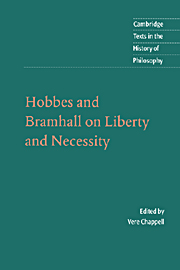Book contents
- Frontmatter
- Contents
- Acknowledgements
- List of abbreviations
- Introduction
- Chronology
- Further reading
- Note on the text
- Bramhall's discourse of liberty and necessity
- Hobbes's treatise Of Liberty and Necessity
- Selections from Bramhall, A Defence of True Liberty
- Selections from Hobbes, The Questions concerning Liberty, Necessity, and Chance
- Selections from other works of Hobbes
- Index
- Cambridge texts in the history of philosophy
Selections from other works of Hobbes
Published online by Cambridge University Press: 05 June 2012
- Frontmatter
- Contents
- Acknowledgements
- List of abbreviations
- Introduction
- Chronology
- Further reading
- Note on the text
- Bramhall's discourse of liberty and necessity
- Hobbes's treatise Of Liberty and Necessity
- Selections from Bramhall, A Defence of True Liberty
- Selections from Hobbes, The Questions concerning Liberty, Necessity, and Chance
- Selections from other works of Hobbes
- Index
- Cambridge texts in the history of philosophy
Summary
The Elements of Law
Chapter XII. How by deliberation from passions proceed men's actions
1. It has been declared already how external objects cause conceptions, and conceptions appetite and fear, which are the first unperceived beginnings of our actions. For either the action immediately follows the first appetite, as when we do anything upon a sudden; or else to our first appetite there succeeds some conception of evil to happen unto us by such actions, which is fear, and withholds us from proceeding. And to that fear may succeed a new appetite, and to that appetite another fear, alternately, till the action be either done, or some accident come between to make it impossible, and so this alternate appetite and fear ceases. This alternate succession of appetite and fear, during all the time the action is in our power to do or not to do, is that we call deliberation, which name has been given it for that part of the definition wherein it is said that it lasts so long as the action whereof we deliberate is in our power. For so long we have liberty to do or not to do, and deliberation signifies the taking away of our own liberty.
2. Deliberation therefore requires in the action deliberated two conditions: one that it be future; the other that there be hope of doing it or possibility of not doing it.
- Type
- Chapter
- Information
- Hobbes and Bramhall on Liberty and Necessity , pp. 91 - 97Publisher: Cambridge University PressPrint publication year: 1999

